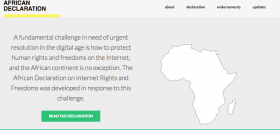
“The African Declaration on Internet Rights and Freedoms (…) promotes human rights standards and principles of openness in internet policy formulation and implementation on the continent,” the Special Rapporteur on the promotion and protection of the right to freedom of opinion and expression, David Kaye, highlighted in his latest report to the Human Rights Council 32nd session.
The African Declaration and the private sector in the digital age
Kaye’s report focuses on the role of the private sector in the digital age, providing an overview of the regulatory ecosystem that underpins the internet and trends in state and private sector action that have an impact on freedom of expression online.
States must not pressure the private sector to take steps that unnecessarily or disproportionately interfere with freedom of expression. Any demands to take down digital content or access customer information must be based on validly enacted law, subject to external and independent oversight, and demonstrate necessary and proportionate means. Governments must also adopt and implement laws and policies that protect private sector development and provision of technical measures, products and services that advance freedom of expression. Private sector actors should develop and implement transparent human rights assessment procedures. These were some of the recommendations highlighted in the report on how to move forward.
Among the tools and frameworks mentioned for identifying private sector information and communications responsibilities, the Special Rapporteur focuses on the Global Network Initiative’s Principles on Freedom of Expression and Privacy, the Manila Principles on Intermediary Liability (both initiatives in which APC has participated), the Ranking Digital Rights Corporate Accountability Index, and the African Declaration on Internet Rights and Freedoms, which was initiated in 2013 by a small group of civil society organisations, including APC, at the African Internet Governance Forum in Nairobi. Much has changed in the region and in the world since that initial meeting, including a stronger focus on movement building through the African Declaration’s new website, which incorporates comments from a wide range of people to make the document stronger and as inclusive as possible. We recently reviewed its most important highlights and accomplishments for African internet rights.
“The Declaration is just an instrument, but quite an important one. Being mentioned in the Special Rapporteur’s report means that it is increasingly getting recognition from the human rights community,” APC Executive Director Anriette Esterhuysen said. “It is one more step in the process of getting the African Commission to adopt a resolution to support the Declaration and what it stands for. The aim is to kick-start engagement in this important human rights mechanism and set in motion the process of getting the African Declaration adopted by the Commission, which will hopefully happen soon.”
Are you interested in internet rights in Africa?
- Follow #AfricanInternetRights on Twitter
- Learn about our project Building feminist cross-movement collaboration and action on internet and human rights in Africa, Asia and Latin America and the Caribbean, which aims to contribute to building a strong and diverse internet rights movement in the global South through the African Declaration on Internet Rights and Freedoms and the Feminist Principles of the Internet .